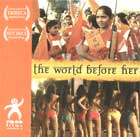
The World Before Her 2012
Distributed by Ro*co Films International, llc, 80 Liberty Ship Way, Suite 5, Sausolito, CA 94965; 415-332-6471
Produced by Storyline Entertainment, Nisha Pahuja and Cornelia Principe
Directed by Nicha Pahuja
DVD, color, 91 min.
Sr. High - General Adult
Gender Studies, Postcolonialism, Sociology, Women’s Studies
Date Entered: 03/15/2013
Reviewed by Linda Frederiksen, Washington State University, Vancouver, WAThe concept of two Indias is not a new one. Rich vs. poor, Muslim vs. Hindu, city vs. village educated vs. illiterate, modern vs. ancient are all cited as examples of the country’s characteristic dualism. Nowhere is the disparity greater, however, than between the sexes. While a notable few have achieved some level of prosperity and equality, the vast majority of women have no rights, voice, or options. To be a woman in India, where females are still routinely aborted, killed at birth, beaten, forced into arranged marriages, and raped, is no easy existence.
Written and directed by Canadian-based filmmaker Pahuja, this feature-length documentary examines two possible scenarios for a young woman in modern India. On the one hand is Ruhi, a pretty teenager from Jaipur, entered in the 2011 Miss India pageant. To compete against 19 other equally attractive young women who also seek the recognition and status the crown can provide, Ruhi undergoes a rigorous month-long beauty course that includes instructions on hair and make-up, along with skin bleaching and botox. At the other end of the spectrum is Prachi, a camp counselor for Durga Vahini, a fiercely fundamentalist organization that recruits girls from poor, rural families to uphold traditional values and engage in militant activism. Although both Ruhi and Prachi may have a few more opportunities for identity and career than their mothers’ generation, both still live within tightly controlled male-dominated systems. The world before Ruhi and Prachi is a discouraging one. This film is recommended as a thoughtful consideration of difficult and unanswered questions about culture, tradition, women’s rights and westernization.
Selected Awards
- Best Documentary Feature, 2012 Tribeca Film Festival
- Top 10, Audience Choice, 2012 Tribeca Film Festival
- Best Canadian Feature, 2012 Hot Docs Film Festival
- Top 10, Audience Choice, 2012 Hot Docs Film Festival
- Best Canadian Documentary, 2012 Vancouver Film Critics Circle Award
- Top 10, Audience Choice, 2012 Vancouver International Film Festival
- Top 5, Audience Choice, 2012 Palo Alto Film Festival